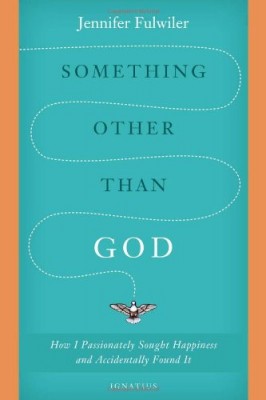Popular Catholic blogger Jennifer Fulwiler just published her long awaited memoir, Something Other Than God. The book is enjoying exposure and praise typically reserved for secular tales. When I saw the book profiled on Forbes.com, a real feat for a Catholic conversion story, I braced myself for something compelling.

The memoir is written with the creative details and texture of fiction. This style makes it a winner among readers, and favorable Amazon reviews already top an impressive 300.
Young Fulwiler seems to happily bop along to a fun 80s soundtrack until friends compare notes about church attendance. Suddenly, this girl who self identifies as atheist doesn’t fit in. Aside from the social anxieties of not “being saved” in the fervent South, her brain starts to ponder existential questions that are too agitating to fully engage. What happens to us when we die if this is all there is?
Eventually, she’s a busy professional and meets a special man at a meeting. She deems herself too smart for God talk and isn’t interested in angels, but a thought came out of nowhere, “You are going to marry him.” And she did!
They enjoy a luxurious lifestyle together, but her existential crisis kicks in again and gives way to earnest and persistent questioning. She shows us how she finally finds conversion with her husband.
Motherhood accelerated her journey. The miracle of life brought God close, and helped her accept the sanctity of that life. Reading up on what "pro-choice" actually means these days convinced her to stop waving that feminist flag.

She also credits her blog, Conversion Diary, and friendly commenters for helping her move forward. Her witness offers an example of digital media and fellowship at its best, something Christians everywhere can hold as an ideal use of technology.
This couple’s conversion coincided with a simplification of life. I thought the story of sacrifice was a brilliant juxtaposition to the trendy "get rich quick" programs these days that assure us of their spiritual foundations.
A genetic blood clotting disorder and her need of a Category X medication forced her to examine contraception. My opinion is that her depiction could potentially cause people to scrutinize Church teaching more rather than accept it wholesale. Yet, Fulwiler at least shows us that contraception is not a trivial matter. After all, it's becoming all too common for moms to almost brag about their sterilizations at play dates with no notion of the moral or health implications.
Which brings me to my take-away. Catholics will nibble on this book for its excellent chronicling of conversion and converts will like tracing Fulwiler’s steps whilst comparing notes. But it is also a socially appropriate way to introduce a well-off suburban mom or middle class woman to the faith if they inquire.
As a convert myself, I recall the unimaginative proselytizing that my family endured in our neighborhood and feel that this memoir would have been more interesting and palatable. It doesn't have the bitterness of less mature conversion stories or the condescending tone of some apologetics materials.
I saw that the book was critiqued for not spotlighting the abuse crisis within the Church and fiercely analyzing that from a skeptic’s perspective. Hold on a second, whose story is this? If an issue wasn’t critical to Fulwiler’s personal choice to convert, it shouldn’t be in the memoir.
Aside from the story's potency as a faith-sharing tool, I could hardly put it down. It's a really good read, and that is reason enough to get it.
Be sure to check out our Book Notes archive.
Copyright 2014, Amy Bonaccorso
About the Author

Guest
We welcome guest contributors who graciously volunteer their writing for our readers. Please support our guest writers by visiting their sites, purchasing their work, and leaving comments to thank them for sharing their gifts here on CatholicMom.com. To inquire about serving as a guest contributor, contact editor@CatholicMom.com.



.png?width=1806&height=731&name=CatholicMom_hcfm_logo1_pos_871c_2728c%20(002).png)
Comments